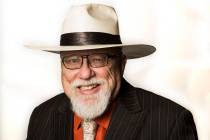Caregiver struggles, joys come out onstage
It’s an opportunity.
To get a sense of what’s coming. To see you’re not alone. To meet people. To find out about classes and support groups.
The play — “Caregiver Collage” — being performed downtown at 5:30 p.m. Wednesday at the Cleveland Clinic Lou Ruvo Center for Brain Health brings to life the challenges and joys of caregiving through vignettes. It also lets soon-to-be caregivers learn coping strategies and start relationships that guard against the isolation.
The production, written by Las Vegas playwright Douglas Hill and performed in Las Vegas in 2009 and in Washington, D.C., in 2012, is based on interviews done five years ago with caregivers associated with the Ruvo Center.
One of those caregivers was Jean Georges, who lost her husband to Alzheimer’s disease three years ago. She said the play “was done with great sensitivity. … There was even humor because, believe it or not, there is some with a terrible disease like Alzheimer’s. … But I couldn’t speak for quite a while after it was done, because I was afraid I would go into a crying fit.”
During the play performed by The Speeding Theatre — Over 55 group of Las Vegas, the character Marion’s growing sense of isolation — friends and family who are uncomfortable with chronic disease often stay away from caregivers because they don’t know what to say — is heartbreaking:
“I’m all alone. My mother lives with me now, and I’m all alone. When I ask her a question, sometimes she won’t answer it. No matter how many times I ask. I’m all alone, Lord. Bill won’t visit. People from church don’t visit. I don’t ask them, but can’t they see how alone I am? One visitor. Someone. Anyone. I want someone to talk to … just … talk to. It’s too quiet.”
After the play, which lasts less than an hour and is free to attend, Dr. Dylan Wint, the Ruvo Center’s education director in neurodegenerative diseases and social services director Susan Hirsch will lead an open discussion during which audience members can react to the play and share caregiving experiences.
It’s also a time when audience members can learn about the free classes, support groups and counseling sessions the Ruvo Center offers for caregivers of loved ones with diseases that range from Parkinson’s and Huntington’s to multiple sclerosis and Alzheimer’s. It’s also when they can get names and phone numbers of others in the audience, people they could speak with to combat the often terrible loneliness of caregiving.
Studies show caregivers should reach out for help.
Albert Chavez, Southern Nevada regional director of the Desert Southwest Chapter of the Alzheimer’s Association, says the role of the at-home caregiver for Alzheimer’s patients is so stressful that it is not unusual for the caregiver to die before the patient.
Georges, now 82, almost did.
In 2003, Georges started to see a change in her husband, Leonard. A successful businessman, he began to make investment and real estate deals that were long on promises and sure only to make someone else money. Though they started to argue, never, she said, did she suspect a medical problem.
Nor did she suspect a medical problem when he became agitated when he didn’t get his way, or accused her of not writing letters he never asked her to write, or asked her the same questions repeatedly.
She just chalked it up to his working 17-hour days for years finally catching up to him. But the arguing wore on her. She couldn’t eat. She couldn’t sleep. Her nerves were shot.
She went to the Mayo Clinic in Scottsdale, Ariz., for a checkup. Soon after she arrived, she had a heart attack.
The Mayo doctors told her if she wanted to live she could no longer care for her husband — the stress would kill her.
Tests suggested her husband had Alzheimer’s.
Today, she volunteers at the Ruvo Center and tells anyone who’ll listen that she wishes the center had been operating when her husband started acting differently. She says she’s sure her husband would have been diagnosed earlier. Other doctors had said his behavior was just a normal part of aging.
“I would have never argued with him if I knew he had Alzheimer’s,” she said. “That’s the golden rule for caregivers and I was violating it.”
Instead of getting irritated with him for asking the same questions over and over, she would have changed the subject. She might have asked her husband, for example, if he remembered a concert they both enjoyed. In other words, distract, never argue. It’s the kind of advice you receive at the Ruvo Center when you’re in a support group for Alzheimer’s caregivers.
“I don’t think I would have had a heart attack and I’m not sure I would have had to put Leonard in a home if I known how to deal with Alzheimer’s,” she said. “We could have laughed in our last years. I hope people take advantage of this play and all they can learn about what’s offered at the Ruvo Center. It can make caregiving easier and life richer at the end.”
(For planning purposes, Ruvo Center officials would appreciate people indicating they’re coming to the play by visiting www.keepmemoryalive.org and clicking on events and registering. But those who can’t register by computer are welcome.)
Contact reporter Paul Harasim at pharasim@reviewjournal.com or 702-387-2908.

















